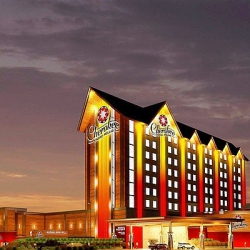The Cherokee Nation of Oklahoma is laying plans to open a casino in neighboring Arkansas. The casino is one of three hoped-for casinos which might happen, if a proposed Arkansas constitutional amendment passes in the fall.
A group called “Arkansas Wins in 2016” is trying to collect enough signatures in order to have a referendum placed on the ballot in November. Arkansas Wins in 2016 is backed by a coalition of gaming interests which stand to gain from the three proposed casinos.
Washington County Casino
At present, Cherokee Nation Entertainment has a deal in place with the Catoosa Native American enterprise. Under the terms of its deal, the Cherokee Nation would manage a casino for the Catoosa enterprise. The Cherokees already operate 9 casinos in Oklahoma, so they have a wealth of experience running casino operations.
If plans go according to Hoyle, the Catoosa enterprise would receive a brick-and-mortar casino licene for Washington County in Northwest Arkansas. The referendum also would approve casinos in Miller County in southwest Arkansas, as well as Boone County in the Ozark Mountains.
Arkansas Wants Trusted Operators
Presumably, all three casinos would be managed by respected and established gaming entities.
Robert Coon, speaking on behalf of “Arkansas Wins in 2016“, said of the Cherokee Nation’s involvement: “Our intention from the outset of this campaign has been for the casinos authorized by this amendment to be operated by well-established [and] credible firms in the gaming industry. In addition to creating new opportunities for jobs, tourism and economic development, Cherokee Nation Entertainment brings a wealth of experience and a proven track record in the gaming industry to this effort.”
The ballot initiative does more than approve 3 land-based casinos. It also establishes a 5-member regulatory panel, likely to be called the Arkansas Gaming Control Board or the Arkansas Gaming Council.
18% Taxes on Gaming Revenues
If passed, the casinos each would pay 18% on all gambling revenues. This would be the first modern full casinos for Arkansas. Oaklawn Park Race Track in Hot Springs and Southland Park Gaming And Racing in West Memphis have electronic gaming machines, but they do not allow table games or poker.
The November referendum might not come to pass. For a constitutional amendment to be placed on the ballot in November, the gaming advocacy group needs to collect at least 85,000 signatures by July 8. In such cases, it is always best to overshoot the number needed, in case signatures are dismissed for any reason.
About the Cherokee Nation
If the vote happens and the initiative passes, then it could usher in a new era for the Cherokee Nation of Oklahoma.
Shawn Slaton, the CEO for Cherokee Nation Entertainment’s parent company, Cherokee Nation Businesses, told the AP, “It’s been an interest of ours for many years to leverage our nearly 30 years’ experience in gaming, hospitality and entertainment into markets outside of Oklahoma. This commercial gaming venture is a natural evolution of our business model that will be good for the state, northwest Arkansas and the Cherokee Nation.”
The Cherokee Nation of Oklahoma has casinos in Fort Gibson, Ramona, Roland, Sallisaw, South Coffeyville, Tahlequah, West Siloam Springs, and Claremore (racino). These are the Cherokee Casino Fort Gibson, Cherokee Casino Grove, Hard Rock Casino in Tulsa, Cherokee Casino Ramona, Cherokee Casino & Hotel Roland, and Cherokee Casino Will Rogers Downs. as well as the Cherokee-brand casinos in Sallisaw, South Coffeyville, Tahlequah, and West Siloam Springs.
History of the Cherokee Nation
The Cherokee Nation is the largest Native American tribe in the United States, just ahead of the Navajo and Lakota.
Historically, the Cherokee Nation was located in parts of Georgia, Tennessee, North Carolina, and South Carolina. By the 19th Century, they were one of the “Five Civilized Tribes”, and were given the right by treaty in 1817 to become United States citizens. In doing so, they became arguably the first non-European ethnicity to gain citizenship status.
Unfortunately, that newfound legal status was no help to the Cherokees when the United States passed the Indian Removal Act of 1830. The act allowed then-US President Andrew Jackson to negotiate the removal of eastern Native American tribes to territories west of the Mississippi River. Despite the protest of Christian groups, this led to tribes like the Choctaws and Cherokee’s removal to Oklahoma. Under the Treaty of New Echota of 1835, the Cherokees were removed west, undergoing the forced migration known as the “Trail of Tears”.
In 1986, the United States Supreme Court ruled that these treaties between the US federal government and the Native American tribes were viewed then (and now) as treaties among sovereign nations. Thus, tribal lands were seen as sovereign territory and were not subject to anti-gaming laws passed by adjacent states. This led to a network of tribal gaming compacts and hundreds of tribal casinos across the United States. Of the tribes involved, the Cherokee Nation is one of the most successful of the tribal gaming authorities.

